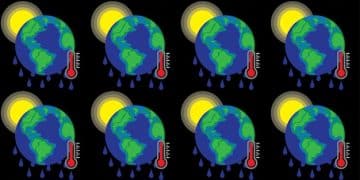2025 UN Climate Conference: Impact on US Foreign Policy

The 2025 UN Climate Change Conference (COP30) is poised to significantly influence US foreign policy, potentially reshaping international agreements, trade relationships, and diplomatic priorities as the US navigates its commitment to global climate goals.
The upcoming 2025 UN Climate Change Conference, also known as COP30, is set to be a pivotal moment for global climate action and will likely have profound implications for US foreign policy, influencing everything from international agreements to trade relations.
Understanding the UN Climate Change Conference
The UN Climate Change Conference, officially known as the Conference of the Parties (COP), is an annual gathering where countries that have signed the UN Framework Convention on Climate Change (UNFCCC) come together to discuss and negotiate climate action. These conferences are crucial for setting global climate goals and policies.
What is COP and Why It Matters
COP serves as the primary decision-making body of the UNFCCC. It brings together representatives from nearly every country to assess progress in dealing with climate change, establish legally binding obligations for developed nations, and promote the transfer of green technologies to developing countries. The outcomes of COP meetings directly influence the environmental policies and diplomatic strategies of participating nations.
Key Goals of the 2025 Conference
The 2025 conference will likely focus on enhancing the commitments made under the Paris Agreement, particularly in the areas of emission reduction, adaptation, and financial assistance to developing countries. A central goal is to build on past agreements to accelerate the transition to a low-carbon economy and to ensure that the most vulnerable nations receive the support they need to cope with the impacts of climate change.
- Accelerating the reduction of greenhouse gas emissions
- Enhancing adaptation measures to cope with climate impacts
- Mobilizing financial resources for climate action in developing countries
- Promoting technological innovation and transfer
Ultimately, the expectations for COP30 are high, with many looking to see if nations can collectively rise to the challenge of addressing climate change with the urgency and scale that science demands.
Potential Shifts in US Foreign Policy
The 2025 UN Climate Change Conference has the potential to trigger significant shifts in US foreign policy. The US, as one of the world’s largest economies and a major emitter of greenhouse gases, plays a critical role in international climate negotiations. Its stance and commitments can set the tone for global climate action.

Realigning Diplomatic Priorities
The conference could prompt the US to realign its diplomatic priorities, placing greater emphasis on climate-related discussions and collaborations with other nations. This may involve strengthening partnerships with countries committed to ambitious climate goals and exerting diplomatic pressure on nations lagging in their emission reduction efforts.
Trade Policy and Climate Agreements
Trade policy could also be affected as the US considers incorporating climate-related provisions into trade agreements. This could involve imposing tariffs on goods from countries with weak environmental standards or offering incentives for nations that adopt sustainable practices. The goal would be to leverage trade as a tool for promoting global climate action.
- Integrating climate considerations into trade negotiations
- Establishing carbon tariffs on high-emission imports
- Providing incentives for countries adopting green technologies
- Promoting sustainable supply chains
The US approach to international finance, particularly its contributions to the Green Climate Fund and other climate finance mechanisms, will also be under scrutiny. Increased financial commitments could strengthen the US position in climate negotiations and demonstrate its willingness to support developing countries in their climate efforts. Conversely, inadequate contributions could undermine US credibility and influence.
Areas of International Cooperation
Addressing climate change requires extensive international cooperation across various sectors. The 2025 UN Climate Change Conference will likely highlight areas where collaboration is essential for achieving global climate goals.
Technology Transfer and Innovation
One crucial area is technology transfer. Developed countries, including the US, can play a key role in helping developing nations access and implement clean energy technologies. This could involve sharing patents, providing technical assistance, and investing in research and development projects that benefit developing countries.
Joint Research Initiatives
Joint research initiatives are also vital. Collaborative research can accelerate the development of innovative solutions for climate mitigation and adaptation. The US could partner with other countries to conduct research on carbon capture, renewable energy storage, and climate resilience.
- Establishing international research consortia
- Sharing research data and findings
- Providing funding for collaborative projects
- Creating platforms for knowledge exchange
Additionally, policy coordination is essential for effective climate action. Countries can learn from each other’s experiences and adopt best practices in areas such as carbon pricing, energy efficiency, and land use management. International forums like COP provide opportunities for policymakers to exchange ideas and coordinate their efforts.

Challenges and Opportunities for the US
The 2025 UN Climate Change Conference presents both challenges and opportunities for the US. Navigating these effectively will be crucial for shaping US foreign policy and maintaining its influence in the international arena.
Balancing Domestic and International Priorities
One of the main challenges is balancing domestic and international priorities. The US needs to align its climate policies with its economic and energy interests. This may involve making difficult decisions about transitioning away from fossil fuels and investing in renewable energy infrastructure.
Political Polarization and Climate Action
Political polarization within the US also poses a significant challenge. Different political factions have divergent views on climate change and the appropriate policy responses. Overcoming this division and building consensus on climate action will be essential for ensuring the long-term effectiveness of US climate policy.
- Building bipartisan support for climate initiatives
- Engaging stakeholders from different sectors
- Communicating the benefits of climate action
- Addressing concerns about economic impacts
However, the conference also offers significant opportunities. The US can enhance its reputation as a global leader on climate change by committing to ambitious emission reduction targets and providing financial and technical assistance to developing countries. This could strengthen its diplomatic relationships and increase its influence in international affairs.
The Role of Non-State Actors
In addition to governments, non-state actors play an increasingly important role in climate action. The 2025 UN Climate Change Conference will likely highlight the contributions of businesses, civil society organizations, and local governments.
Private Sector Engagement
The private sector is a key driver of innovation and investment in clean energy technologies. Businesses can contribute to climate action by adopting sustainable practices, investing in renewable energy, and developing low-carbon products and services. The US government can incentivize private sector engagement through tax credits, subsidies, and regulatory reforms.
NGOs and Advocacy Groups
Civil society organizations and advocacy groups also play a crucial role in raising awareness about climate change, mobilizing public support for climate action, and holding governments accountable for their commitments. These groups can bring valuable perspectives to the table and help shape the policy debate. Their involvement can foster greater transparency and inclusivity in climate decision-making.
- Supporting advocacy groups to raise awareness
- Facilitating collaboration between government and non-profits
- Promoting corporate sustainability initiatives
- Ensuring transparency in climate action reporting
Local governments are also on the front lines of climate action, implementing policies to reduce emissions, increase resilience to climate impacts, and promote sustainable development. Cities and regions can serve as laboratories for innovation, testing new approaches to climate mitigation and adaptation.
Looking Ahead: The Path to 2030
The 2025 UN Climate Change Conference is a critical milestone on the path to achieving the goals of the Paris Agreement by 2030. The decisions made at the conference will shape the trajectory of global climate action and determine whether the world can avoid the most catastrophic impacts of climate change.
Setting Ambitious Targets
One of the key priorities is to set more ambitious emission reduction targets. The current commitments under the Paris Agreement are not sufficient to limit global warming to 1.5 degrees Celsius above pre-industrial levels, which scientists say is necessary to avoid the worst consequences of climate change. The US can play a leading role in encouraging other countries to increase their ambition.
Tracking Progress and Enhancing Transparency
Tracking progress and enhancing transparency are also essential. Countries need to have robust systems for monitoring and reporting their emissions and climate actions. This will allow the international community to assess whether countries are meeting their commitments and identify areas where greater effort is needed. Transparent reporting can also build trust and foster cooperation among nations.
- Establishing clear metrics for measuring progress
- Conducting regular assessments of climate action
- Promoting data sharing and collaboration
- Building capacity for monitoring and reporting
Finance will continue to be a crucial issue, with developing countries seeking assurances that they will receive the financial support they need to implement their climate plans. The US and other developed countries need to fulfill their commitments to mobilize climate finance and provide assistance to vulnerable nations.
| Key Point | Brief Description |
|---|---|
| 🌍US Foreign Policy Shifts | Potential changes in diplomatic and trade priorities. |
| 🤝 International Cooperations | Technology transfer and joint research initiatives |
| ⚡Challenges and Opportunities | Balancing domestic and international climate priorities. |
| 🌱 Non-State Actors | Role of private sector and NGOs to foster climate action. |
Frequently Asked Questions
▼
The conference primarily aims to enhance commitments under the Paris Agreement, focusing on emission reduction, adaptation measures, and financial support for developing nations.
▼
The US may integrate climate provisions into trade agreements, like tariffs for countries with poor environmental standards or incentives for those adopting green technologies.
▼
Businesses, NGOs, and local governments contribute by promoting sustainability, raising awareness, and implementing climate-friendly policies.
▼
Balancing domestic economic interests with international climate goals and addressing political divisions on climate action are key challenges for the US.
▼
The US can demonstrate leadership by committing to ambitious emissions targets and providing financial and technical assistance to developing countries, enhancing its global reputation.
Conclusion
In conclusion, the 2025 UN Climate Change Conference presents a critical opportunity for the US to shape its foreign policy in alignment with global climate objectives, promoting international cooperation, addressing domestic challenges, and fostering a sustainable path forward.





